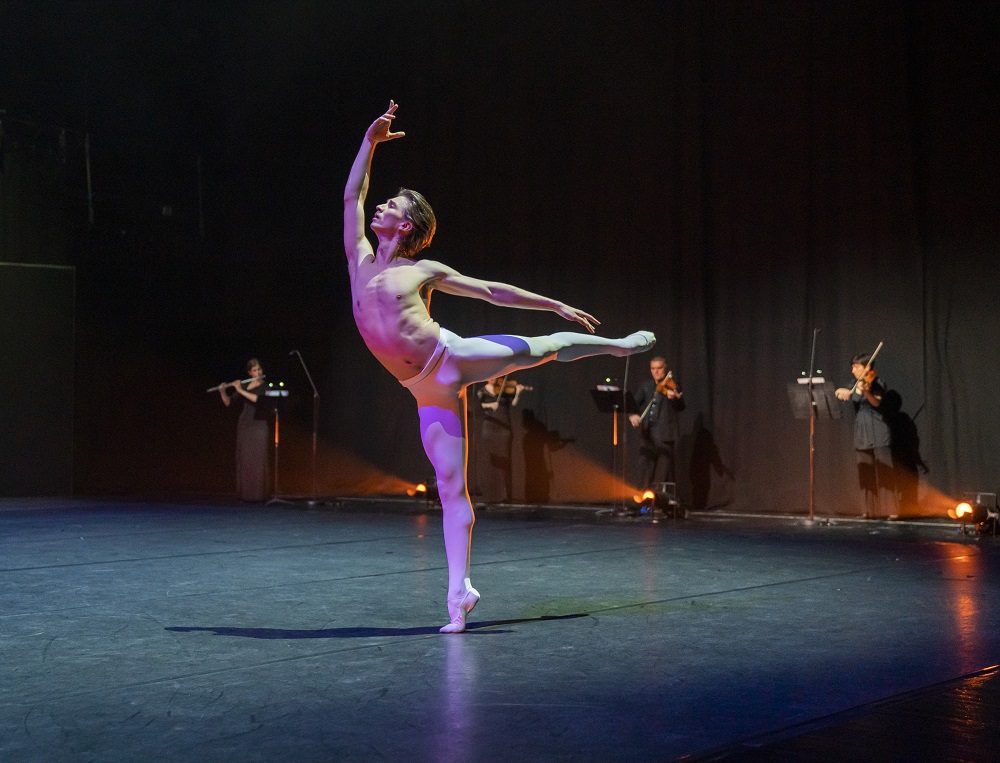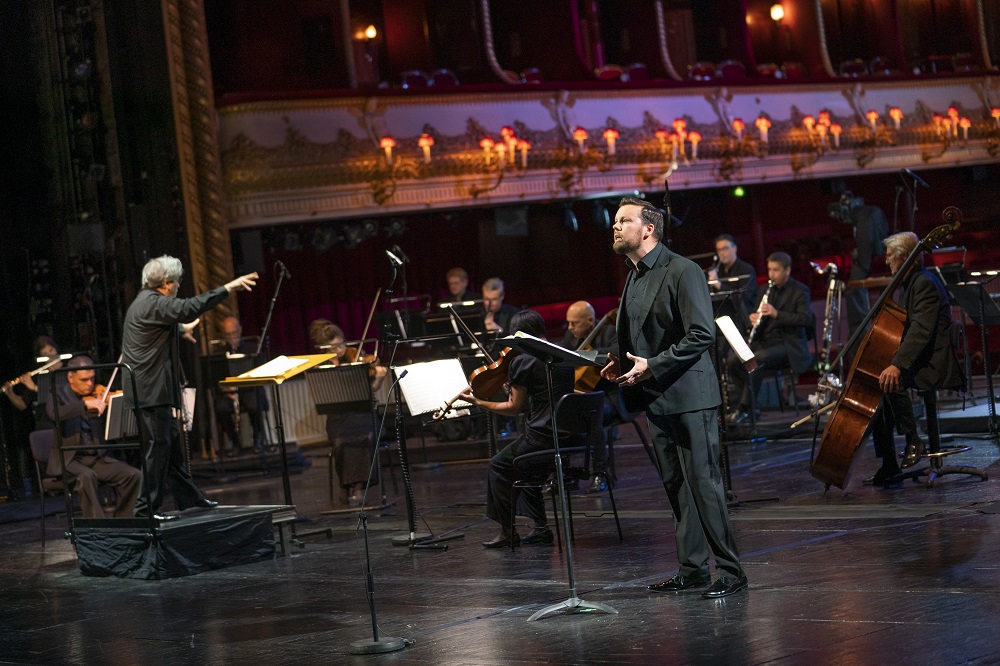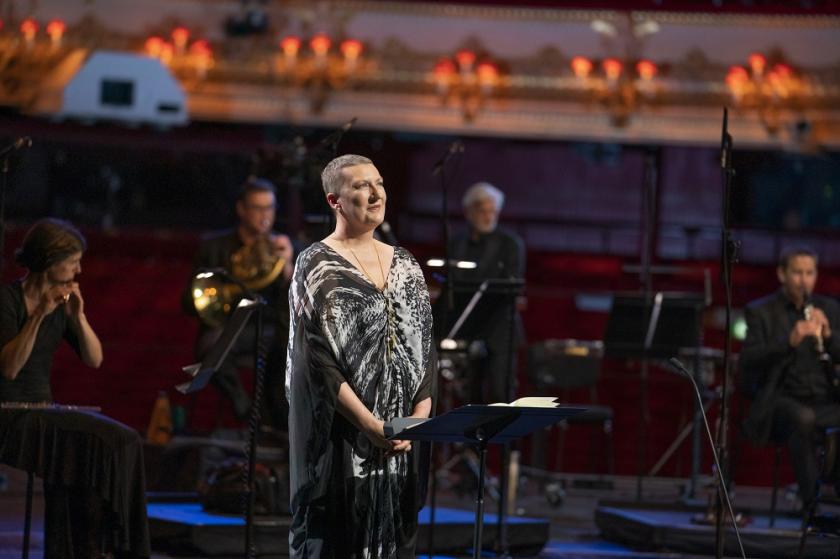Solitude, mortality and transcendence have never been more profoundly expressed in music than by Mahler, who composed Das Lied von der Erde (The Song of the Earth) in the valley of the shadow of death (too superstitious to give it the name of Ninth Symphony, though that and a sketched-out Tenth did follow, he never lived to hear it performed). It seems like the perfect work to benefit from a silent background in an otherwise empty Royal Opera House - though there's no substitute for the intense silence of a full audience. Gluck, too struck his deepest note with the highest ones of the lacerating flute solo he added as middle sequence to the "Dance of the Blessed Spirits" when he revised his Orfeo ed Euridice.
It was a mini-masterstroke, as preface to the Mahler, to have Vadim Muntagirov so fluidly express Ashton's unquiet choreography (the outer portions aren't used). As with last week's McGregor Pas de Deux to Strauss's "Morgen", this was suggestive of turbulence beneath the calm surface, conveyed by four players standing at the side of the stage. And "mini-masterstroke" might be a way of describing Schoenberg's chamber arrangement, so flexibly mastered n turn by Antonio Pappano.  Each of his Royal Opera Orchestra players, especially Vasko Vassilev and the wind soloists, deserve a credit alongside mezzo Sarah Connolly and tenor David Butt Philip. The circumstances were always going to be moving in themselves, much as they had been when Brigitte Fassbaender performed the great, half-hour final "Das Abschied"("he Farewell") in a CRUSAID concert at the Royal Festival Hall. Dame Sarah has been remarkably public about her treatment for breast cancer; she made one appearance in the midst of it last year, as soloist in Elgar's The Music Makers at the Proms, but now returns in full flight. The funeral march at the heart of the "Abschied" saw her unobtrusively leave the stage, only to return for a last sequence as nuanced and moving as any I've heard: symbolic of absence and resurrection, a journey to the underworld and back like the one made by Orpheus.
Each of his Royal Opera Orchestra players, especially Vasko Vassilev and the wind soloists, deserve a credit alongside mezzo Sarah Connolly and tenor David Butt Philip. The circumstances were always going to be moving in themselves, much as they had been when Brigitte Fassbaender performed the great, half-hour final "Das Abschied"("he Farewell") in a CRUSAID concert at the Royal Festival Hall. Dame Sarah has been remarkably public about her treatment for breast cancer; she made one appearance in the midst of it last year, as soloist in Elgar's The Music Makers at the Proms, but now returns in full flight. The funeral march at the heart of the "Abschied" saw her unobtrusively leave the stage, only to return for a last sequence as nuanced and moving as any I've heard: symbolic of absence and resurrection, a journey to the underworld and back like the one made by Orpheus.
No-one need have feared she might break down in this nakedly emotional, yet still spare, music: the consummate professional, she might have needed to keep the voice at full, lustrous sheen in "The Lonely Man in Autumn", less introverted than usual. Maybe too there were more breaths to break up some of the phrases, but all of them logically argued. A special radiance lit up "On Beauty", the hell-for-leather horse ride at its centre impressively articulated in perfect synchronisation with Pappano and his players. But the truly unforgettable stretches were those evocations of cool breezes in a darkening landscape and the questioning of the friend in the second of the Chinese poems which make up "Das Abschied" - "warum, warum", why must the traveller take his leave?  Equal credit here to leader Vasko Vassilev, making sure we rarely missed the collective first violins of Mahler's full score - Schoenberg's chamber music is sometimes a revelation - and to flautist and oboist for the freedom of their sympathetic birdsong and lament (all the players should have been credited, but they were in good company of omission - Schoenberg wasn't mentioned either). Only at the very beginning, in the tumult of "The Drinking Song of the Sorrow of the Earth", do we miss larger forces, wanting the summons of four horns rather than one.
Equal credit here to leader Vasko Vassilev, making sure we rarely missed the collective first violins of Mahler's full score - Schoenberg's chamber music is sometimes a revelation - and to flautist and oboist for the freedom of their sympathetic birdsong and lament (all the players should have been credited, but they were in good company of omission - Schoenberg wasn't mentioned either). Only at the very beginning, in the tumult of "The Drinking Song of the Sorrow of the Earth", do we miss larger forces, wanting the summons of four horns rather than one.
Yet it's clear that Butt Philip (pictured above with Pappano and the players) would hold his own against an entire orchestra. He managed the difficult middle-to-upper range in which Mahler awkwardly sets his his tenor solos without any hint of strain. All was clarion, vivid and sensitive to dynamic/expressive nuances. Let's not forget we live in an age of lyric-hero tenor gold among the younger generation of British singers; I also want to hear what Nicky Spence and Allan Clayton make of this music. There's time, and when we encounter Das Lied von der Erde next, may it be with a complete orchestra in the flesh. No complaints here about filming or immediacy; you should be moved to tears, as I was. Don't hesitate to support the Royal Opera with the very modest £4.99 admission fee.















Add comment